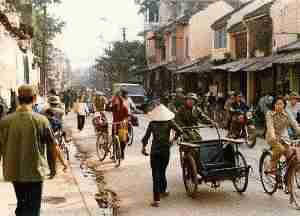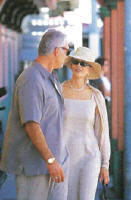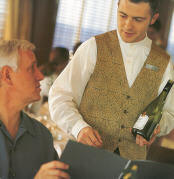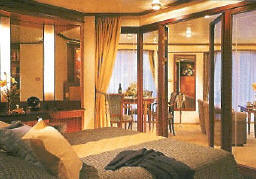Hanoi
has a long and interesting history, going back more than 2,000 years. For a
summary of the history of Vietnam,
click here.
Van Mieu
(The Temple of Literature)
Vietnam's first university, founded in
1070 by Emperor Ly Thanh Tong, is a pleasant retreat from the streets of
Hanoi. It's a rare example of traditional Vietnamese architecture and is an
interesting introduction to Confucianism.
Five
courtyards represent the essential elements of nature. A central path
symbolizes the Confucian Middle Path, dividing the complex. Entry
into each courtyard, according to the old signs, requires the completion of
a task; you need only dismount your horse to enter the first courtyard,
known as the Entrance to the Way, but to get to the second courtyard,
the Great Middle Gate, you must accomplish virtue and attain talent.
(Or pay a US$1 entrance fee.)
After you've
achieved excellence in literary expression, head to the Constellation of
Literature Pavillion, an architectural marvel considered a symbol of the
city. This is the entrance to the third courtyard, the Garden of the
Stelae where the names of all graduates since the 1400s are inscribed on
the backs of stone turtles.
After
synthesizing the teachings of Confucius, head to the fourth Courtyard of
the Sages, where you can make an offering to the great teacher. The
fifth courtyard, the School for the Sons of the Nation, housed
dormitories and classrooms for the university. It was all but destroyed by
French shelling in 1947, and little remains of the original structure.
Ho Chi Minh's Mausoleum
Within an
enormous concrete cubicle, surrounded by guards in snowy, bleached-white
uniforms, lies the embalmed body of Ho Chi Minh despite his requested to
be cremated after death. It's a free tour, and it's interesting to see how
the visitors, from elderly VC comrades who have made the pilgrimage from
South Vietnam, to student groups from foreign nations, react to the sight of
old Uncle Ho.
Though the
Vietnamese as a whole are disappointed with communism, most show deep
respect and admiration for Ho himself. He is seen as the liberator of the
Vietnamese people from colonialism; the country's subsequent economic
mismanagement is often viewed as the misdoing of Ho's comrades and
successors.
Nearby, Ho
Chi Minh's Stilt House is where the commander lived between 1958 and
1969. It's built in the style of Vietnam's ethnic minorities, and set in a
well tended garden. Everything has been kept just as Ho left it, including a
white chair that was a gift from Fidel Castro and the small room where Ho
slept.
A visit to
the Ho Chi Minh Museum, also close to the Mausoleum, is the perfect
way to round out your history lesson. Divided into two sections, 'past' and
'future,' the displays are rather difficult to understand without and
English-speaking guide. The 1958 Edsel bursting through a wall (a US
commercial failure to symbolize their military failure) is a knockout.
The Old Quarter
The 36
streets of Hanoi's Old Quarter, bustling for more than 1000 years, make up
one of Vietnam's most lively and unusual places to visit. In the 13th
century, Hanoi's artisan guilds established themselves here, each taking a
different street. Today it's a shopping paradise, with specialized streets
named for the products traditionally sold there.
On Hang Ma
(literally, 'Counterfeit St'), pick up some ghost money, traditionally
burned at Buddhist ceremonies for good luck. Other areas have had modern
businesses take over, however Hang Hanh (Onion St) is now better known as
Coffee St for the bars and cafes lining the road.
You can pick
up anything from silk sleeping bag liners to headstones to traditional
medicines, but there are plenty of cultural sights that you won't need to
spend a penny on. Bach Ma Temple (White Horse Temple), a lovely pagoda
attended by white-bearded guards sipping tea, commemorates the appearance of
a divine white horse that appeared to show Ly King where to build the city
walls. You can still witness the emperor's success at the well-preserved
11th century Old East Gate.
Fine Arts Museum
From
excellent examples of 9th century stone sculpture and contemporary paintings
by celebrated artists Nguyen Tu Nghiem, Bui Xuan Phai and Nguyen Sang, this
is the place to see Vietnam's incredible artistic heritage.
Highlights
include several large Buddhist statues, including an impressive Bodhisattva
with 1000 eyes and arms; nationalist propaganda; and a worthy collection of
ultramodern painting and sculpture.
Museum of
Ethnology
This superb
museum showcases the depth of Vietnamese cultural diversity with an
astounding collection of 15,000 artifacts gathered from throughout Vietnam.
Maps, displays and dioramas are labeled in Vietnamese, French and English.
Displays
portray a typical village market, the making of comical hats and a Tay
shamanic ceremony; videos show the real thing. You can also check out a
traditional Black Thai house reconstructed in the museum. There's also a
center for research and conservation where scientists from all over the
world study traditional Vietnamese cultures
.
Vietnamese
Women's Museum
A favorite of
travelers since it opened on Women's Day, October 20, 1995, this is a
surprisingly good look at women in Vietnam. There's the inevitable adoration
of women soldiers fighting for the nation's liberation, and there are also
excellent displays on social equality, development and peace.
The
collection is divided into four themes: Vietnam's mothers; female historical
figures; women's unions; and the various ethnic groups in Vietnam. Well
worth seeing are recreations of a typical rural kitchen, underground meeting
rooms and the 54 different national costumes. A guided tour is included in
the ticket price.
back to top
History of Vietnam |






